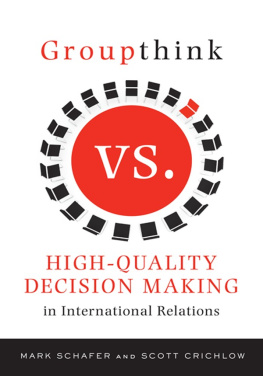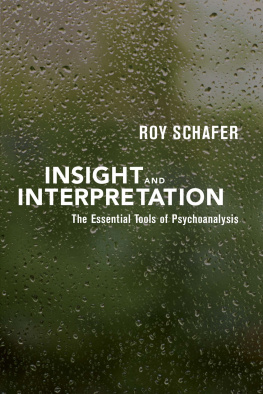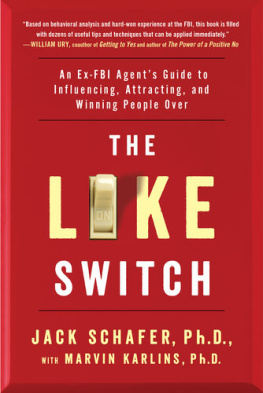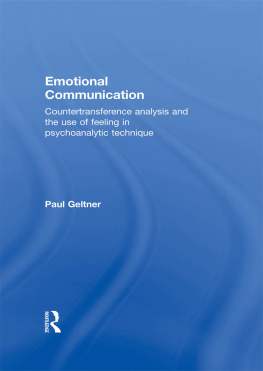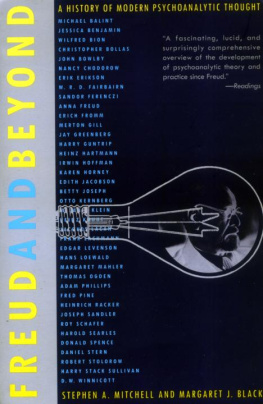Schafer - Bad feelings : selected psychoanalytic essays
Here you can read online Schafer - Bad feelings : selected psychoanalytic essays full text of the book (entire story) in english for free. Download pdf and epub, get meaning, cover and reviews about this ebook. City: New York, year: 2005, publisher: Other Press, genre: Religion. Description of the work, (preface) as well as reviews are available. Best literature library LitArk.com created for fans of good reading and offers a wide selection of genres:
Romance novel
Science fiction
Adventure
Detective
Science
History
Home and family
Prose
Art
Politics
Computer
Non-fiction
Religion
Business
Children
Humor
Choose a favorite category and find really read worthwhile books. Enjoy immersion in the world of imagination, feel the emotions of the characters or learn something new for yourself, make an fascinating discovery.

Bad feelings : selected psychoanalytic essays: summary, description and annotation
We offer to read an annotation, description, summary or preface (depends on what the author of the book "Bad feelings : selected psychoanalytic essays" wrote himself). If you haven't found the necessary information about the book — write in the comments, we will try to find it.
Schafer: author's other books
Who wrote Bad feelings : selected psychoanalytic essays? Find out the surname, the name of the author of the book and a list of all author's works by series.
Bad feelings : selected psychoanalytic essays — read online for free the complete book (whole text) full work
Below is the text of the book, divided by pages. System saving the place of the last page read, allows you to conveniently read the book "Bad feelings : selected psychoanalytic essays" online for free, without having to search again every time where you left off. Put a bookmark, and you can go to the page where you finished reading at any time.
Font size:
Interval:
Bookmark:
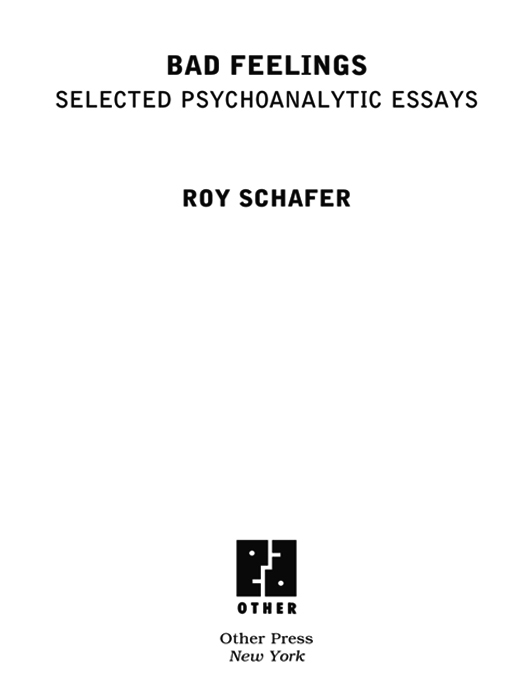
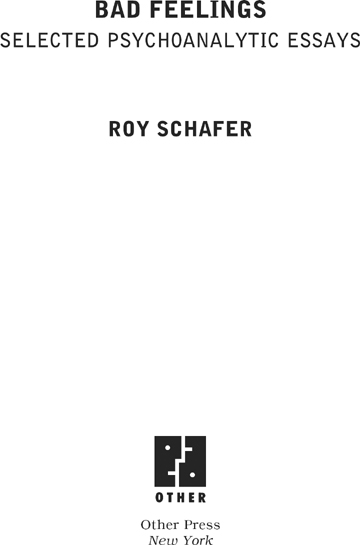
CHAPTER 1
A Joyless Life
CHAPTER 2
Disappointment and Disappointedness
CHAPTER 3
Forms of Extreme Shame: Humiliation and Mortification
CHAPTER 4
Envy: Revisiting Melanie Kleins Envy and Gratitude
CHAPTER 5
The Psychotherapists Absence
CHAPTER 6
Defenses against Goodness
CHAPTER 7
Experiencing Termination: Authentic and False Depressive Positions
CHAPTER 8
Painful Progress: The Negative Therapeutic Reaction Reconceived
My greatest debt I owe to my wife, Dr. Rita V. Frankiel, and my good friend, Dr. William I. Grossman, from both of whom I have received the invaluable gifts of encouragement, sustained interest, helpful criticism, eager expectation, and appreciative response. I am also indebted to the many discussants and reviewers of earlier drafts of much of the material included in these pages; their responses to my journal submissions and presentations at psychoanalytic meetings gave me much to rethink and good reason to revise my preliminary efforts. I have used many of their suggestions. While preparing this book, I benefited from the editorial contributions of Erica Johanson and Bob Hack. Many thanks to Victoria Wright and Barbara B. Frank for their help in preparing the various drafts that went into the making of this book, and special thanks to Lanileigh Ting who prepared me technically and braced me emotionally for beginning to develop manuscripts on a word processor; without her cheerful help, this book would still be far short of completion.
I am grateful to the following copyright holders for permission to reprint here, as book, material that first appeared in their journals: the International Journal of Psychoanalysis for Disappointment and Disappointedness; the Psychoanalytic Quarterly for Defenses against Goodness; and the American Psychological Association for The Psychotherapists Absence and Experiencing Termination: Authentic and False Depressive Positions, both of which first appeared in Psychoanalytic Psychology. Although I have introduced minor changes of content and organization in the interest of enhanced clarity, consistency of style, continuity of content, and reduction of repetition, the arguments of these papers has not been changed in any significant way.
Troubled persons entering psychoanalysis depend on their analysts to maintain their analytic position through thick and thin. For unconsciously, and to some extent consciously, analysands are beset by painful feelings, one of which is hopelessness about being able to get rid of their emotional pain. Neither on their own nor with the help of significant others have they been able to change. Although analysands often seem to throw obstacles in the way of analysis, they do hope that their analysts will stand fast.
On their part, although they do have general guidelines that help them be consistent, analysts also try to learn in each case what constitutes leaving the analytic position, abandoning the analytic attitude, or, as it is said, breaking the frame. It may be offering reassurance, advice, or personal disclosures; it may be engaging in extensive questioning instead of listening to the drift of associations; it may be some or all of these and more. In the analysands psychic reality, these deviations are likely to be experienced in one way or another as threatening. An attentive analyst can pick up the resulting signs of bad feeling even when, overtly, the analysands seem to fall in line and welcome the breaking of the frame: signs of loss of confidence in the analysts security, strength, or clarity of vision; mistrust; and feelings of rejection, abandonment, anger, and despair. The analysand may never have formulated that need for an analyst who remains reliably in place. However, the analyst must be careful never to underestimate the urgency of that need.
Bad feeling can refer to every kind of painful feeling. It need not have any of the moralmore exactly, moralisticconnotations that bad takes on in other contexts: for example, bad manners or bad character. However, unconsciously or even consciously, bad feelings can imply moralistic condemnation, for example, It is bad of you to feel that way! or Youre being a nuisance to worry about that! There are those who, having been scrupulously brought up in families that have elevated mental health to the status of the Eleventh Commandment, believe that they are being bad when they have or express negative feelings. When they begin to feel anxious, glum, or ashamed, they are stricken with guilt or fears of punishment. In these instances, the analyst is witness to severe superego pressure for perfect adjustment. We might say, then, that mental health has become the cleanliness that is next to godliness.
Moralized mental health is only one source of the bad feeling of guilt or anticipated punishment, and these are only two of the many bad feelings that analysts encounter in their daily work. In this book I will highlight a number of bad feelings that are particularly painful. Because anxiety, guilt, and shame are so pervasive, both in human experience and in the clinical material to be covered in these pages, I will not devote entire chapters to them. I will emphasize humiliation and mortification (the extremes of shame); disappointment and, with it, disappointedness as a stance toward life; envy; abandonment; rejection; mournful loss; and the sense of dangerous vulnerability associated with experiencing ones own goodness or that of others and of making genuine progress toward maturity when that step has been anxiously or guiltily avoided for years. Despite its brevity, this list of bad feelings is long enough and the feelings it includes are sufficiently common and complex that, taken together, the chapters of this book have implications for the psychoanalysis of bad feelings in general.
One highlight of maturation is, of course, the development of defenses against painfulhere badfeelings. Consequently, the analysts efforts consistently encounter not the bad feelings themselves but the defenses against them. Some of these defenses may be structured within pathological organizations designed to block feelings totally. In that case, the analysand may be understood as acting on the firm belief that sooner or later any feeling, even good feelinghappiness, confidence, enthusiasm, arousal, and so onwill bring on suffering. illustration of this extreme stand against feelings. Necessarily, then, this book has as much to do with defenses against feelings as with feelings themselves. Most likely the clinical analyst will be required to deal with compromise formations in which each constituent of the analysands conflicts seems to have found limited expression, and that each of these constituentsincluding what appears to be simply defenseis loaded with pleasurable as well as painful feelings.
For the analysand to achieve genuine, stable, and adaptive emotional freedom, the analyst must maintain an empathic, respectful attitude toward the need for defense. Defense is not the enemy. It is essential analytic material as well as a necessary aspect of adaptive living. But because it may impede understanding of whatever it is that must be warded off, its strength or rigidity must be reduced, if extreme, before the analytic process can achieve comprehensiveness and stable, beneficial results. Thus, it is a major part of the analysts job to attempt to work through that need for defense as much as possibleas much as possible because analysis cannot change everything. Under these conditions, the analyst had best beware the temptation to feel omnipotent and then humiliated or otherwise guilty for not being helpful enough. Manifestations of that countertransference inevitably add to the analysands difficulties.
Font size:
Interval:
Bookmark:
Similar books «Bad feelings : selected psychoanalytic essays»
Look at similar books to Bad feelings : selected psychoanalytic essays. We have selected literature similar in name and meaning in the hope of providing readers with more options to find new, interesting, not yet read works.
Discussion, reviews of the book Bad feelings : selected psychoanalytic essays and just readers' own opinions. Leave your comments, write what you think about the work, its meaning or the main characters. Specify what exactly you liked and what you didn't like, and why you think so.





